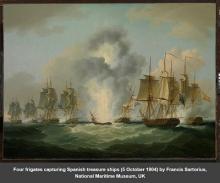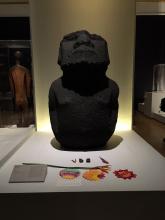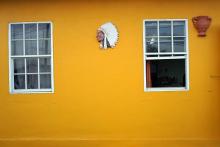Past MPhil Dissertations
Heritage Studies as been taught at the University of Cambridge since 1990 as a specialism within the MPhil in Archaeology. However, from 2019 student will be admitted into a stand-alone MPhil in Heritage Studies. We are understandably proud of the graduates that this programme has produced, who have gone on to lead many areas of the field and industry. To recognise the quality and originality of the work produced by our MPhil students we select several of the top dissertations to feature each year, giving a sense of the great breadth and depth of our discipline.
MPhil Dissertations 2018-19
| Leanne Daly |
Catching Shadows: The Exhibition of Intangible Heritage of Oceania in Lisa Reihana’s in Pursuit of Venus |
|
|
|
|
Click here for access to the full dissertation through the University of Cambridge Open Access Repository |
|
| Citation: | |
| Georgia Ashworth |
The Literary Heritagescape: Translating Literary Settings into Heritage Sites |
|
|
|
|
Click here for access to the full dissertation through the University of Cambridge Open Access Repository |
|
| Citation: | |
MPhil Dissertations 2017-18
| Oliver Antczak |
Unpicking a Feeling: Interrogating the role of heritage in indigenous collective identity formation on the Caribbean island of Bonaire |
|
|
|
| Citation: (2018). Unpicking a Feeling: Interrogating the role of heritage in indigenous collective identity formation on the Caribbean island of Bonaire (Masters thesis). https://doi.org/10.17863/CAM.31764 | |
| Rangga Dachlan |
Constructing Victims of Heritage Destruction: Lessons from the Al Mahdi Reparations Order |
|
|
|
||
| (2018). Constructing Victims of Heritage Destruction: Lessons from the Al Mahdi Reparations Order (Masters thesis). https://doi.org/10.17863/CAM.30860 | ||
| Charlotte Williams |
Shipwrecked Heritage and the 'Midas Touch' of Colonialism: Owning Hybrid Histories |
 This dissertation focuses broadly on how groups own a shared history, whether through doing so by legal property rights or by intellectual or cognitive ownership. It uses examples of material that by its nature is an assemblage from a variety of groups, and indeed at the time, different worlds: ships and their associated cargo between the ‘Old World’ and the ‘New World’ from the 16th to the 19th century. Because these wrecks carry the material of multiple nations both past and present, and due to their locations in international water, ships offer unique opportunities for stakeholders to emerge beyond the boundary of the nation state, which often defines archaeological ownership. Rather than shipwrecked assemblages or ‘treasure’ representing just one category of value, be it monetary, national, or educational, these ‘amphibious’ pieces link both land and sea, public and private property, and tangible and intangible heritage. Using interviews with curators and experts in the field of underwater cultural heritage, a case study, and two databases of shipwrecks with their associated material and ownership battles, the discussion will reveal the tension of owning colonial cargo, and the need for a solution that calls for co-owning hybridity. This dissertation focuses broadly on how groups own a shared history, whether through doing so by legal property rights or by intellectual or cognitive ownership. It uses examples of material that by its nature is an assemblage from a variety of groups, and indeed at the time, different worlds: ships and their associated cargo between the ‘Old World’ and the ‘New World’ from the 16th to the 19th century. Because these wrecks carry the material of multiple nations both past and present, and due to their locations in international water, ships offer unique opportunities for stakeholders to emerge beyond the boundary of the nation state, which often defines archaeological ownership. Rather than shipwrecked assemblages or ‘treasure’ representing just one category of value, be it monetary, national, or educational, these ‘amphibious’ pieces link both land and sea, public and private property, and tangible and intangible heritage. Using interviews with curators and experts in the field of underwater cultural heritage, a case study, and two databases of shipwrecks with their associated material and ownership battles, the discussion will reveal the tension of owning colonial cargo, and the need for a solution that calls for co-owning hybridity. |
|
| (2018). Shipwrecked Heritage and the 'Midas Touch' of Colonialism: Owning Hybrid Histories (Masters thesis). https://doi.org/10.17863/CAM.31836 | |

 Since the United Nations Educational, Scientific and Cultural Organization Convention for the Safeguarding of the Intangible Cultural Heritage in 2003 and the increased prevalence of decolonizing objectives in museums, curators have been faced with the challenge of how to exhibit intangible cultural heritage (ICH). Existing literature on ICH in museums is sparse and that which relates to exhibition technologies like film often focuses on audience effect rather than on content and context of the media or motivations/intentions of curators in their use. This research explores how curators utilize film to exhibit ICH in museums through the case study of Lisa Reihana’s in Pursuit of Venus [infected] (iPOVi). By tracking the creation and exhibition of iPOVi, especially through interviewing various curators of the artwork, it is clear that curators privilege film’s ability to represent complex aspects of culture, like ICH, and utilize the medium to engage with the decolonizing objectives of museums. It is ultimately how ICH characterizes every facet of iPOVi (the medium, content, and filmmaking and exhibition contexts) that allows it to bridge gaps in discourse surrounding material culture and ICH and exposes the potential for filmmaking to become a heritage process.
Since the United Nations Educational, Scientific and Cultural Organization Convention for the Safeguarding of the Intangible Cultural Heritage in 2003 and the increased prevalence of decolonizing objectives in museums, curators have been faced with the challenge of how to exhibit intangible cultural heritage (ICH). Existing literature on ICH in museums is sparse and that which relates to exhibition technologies like film often focuses on audience effect rather than on content and context of the media or motivations/intentions of curators in their use. This research explores how curators utilize film to exhibit ICH in museums through the case study of Lisa Reihana’s in Pursuit of Venus [infected] (iPOVi). By tracking the creation and exhibition of iPOVi, especially through interviewing various curators of the artwork, it is clear that curators privilege film’s ability to represent complex aspects of culture, like ICH, and utilize the medium to engage with the decolonizing objectives of museums. It is ultimately how ICH characterizes every facet of iPOVi (the medium, content, and filmmaking and exhibition contexts) that allows it to bridge gaps in discourse surrounding material culture and ICH and exposes the potential for filmmaking to become a heritage process. This dissertation examines the particular nature of setting-based literary heritage sites. These sites are in a unique position because of their connection to fiction. Three case studies are used to represent a range of setting-based literary heritage sites: Ashdown Forest, The Sherlock Holmes Museum, and Green Gables Heritage Place. The nature of these sites is examined through site observation of tangible and interpreted elements at each site and discussed through three themes: Immersion, Boundaries, and Authenticity. These themes draw from and re-examine current understanding of the heritagescape, and bring forth the challenges of mixing fiction and reality and the difficulties navigating traditional understandings of authenticity at these sites. This research shows how these sites can be analysed as heritage and do not need to be excluded because of their fictional connection. In fact, their unique position among heritage sites allows for new dimensions of the heritagescape to be considered and offers new understandings of how heritage is created and interpreted.
This dissertation examines the particular nature of setting-based literary heritage sites. These sites are in a unique position because of their connection to fiction. Three case studies are used to represent a range of setting-based literary heritage sites: Ashdown Forest, The Sherlock Holmes Museum, and Green Gables Heritage Place. The nature of these sites is examined through site observation of tangible and interpreted elements at each site and discussed through three themes: Immersion, Boundaries, and Authenticity. These themes draw from and re-examine current understanding of the heritagescape, and bring forth the challenges of mixing fiction and reality and the difficulties navigating traditional understandings of authenticity at these sites. This research shows how these sites can be analysed as heritage and do not need to be excluded because of their fictional connection. In fact, their unique position among heritage sites allows for new dimensions of the heritagescape to be considered and offers new understandings of how heritage is created and interpreted. This research attempts to understand how identity and heritage interface with each other in the colonial context of Bonaire in the Dutch Caribbean. By exploring common understandings of how identity and heritage interact, this work applies theories of Indianness, a felt identity based on the adaptation of indigenous populations to a dominant society. Through the critical analysis of interview data in the context of a heritage survey and a historical analysis, this paper finds that heritage and identity production and maintenance are intimately related to colonialism on Bonaire. While many participants designated heritage based on a feeling of Indianness, there was an opposing group of interviewees who instead contested indigenous heritage and searched for historical and scientific legitimization for their heritage and identities. The research concludes that bottom-up understandings of heritage and identity formation are necessary to effectively manage heritage in colonial contexts.
This research attempts to understand how identity and heritage interface with each other in the colonial context of Bonaire in the Dutch Caribbean. By exploring common understandings of how identity and heritage interact, this work applies theories of Indianness, a felt identity based on the adaptation of indigenous populations to a dominant society. Through the critical analysis of interview data in the context of a heritage survey and a historical analysis, this paper finds that heritage and identity production and maintenance are intimately related to colonialism on Bonaire. While many participants designated heritage based on a feeling of Indianness, there was an opposing group of interviewees who instead contested indigenous heritage and searched for historical and scientific legitimization for their heritage and identities. The research concludes that bottom-up understandings of heritage and identity formation are necessary to effectively manage heritage in colonial contexts.  This dissertation looks at the enforcement of legal instruments governing the protection of heritage and the extent to which such enforcement mechanism may be useful for the protection of heritage. It delves into the Reparations Order in the Al Mahdi case to see how the International Criminal Court constructs the notion of victims in the aftermath of the destruction of heritage sites in Timbuktu. This construction entails (i) the identification of victim groups; (ii) the assessment of their harm; and (iii) the determination of reparation type and modalities. Scrutinising the Trial Chamber’s use of the World Heritage Convention, this dissertation reveals gaps in all three areas, privileging local victims at the expense of national and international victims. Wide discretionary powers were found to have chiefly motivated the Court’s uneven analyses and could adversely affect its decisionmaking in future cases. In spite of its limitations, the Court demonstrated usefulness by achieving some expansion in its remit in the protection of heritage and through its role as a figurative “loudspeaker” in publicising the punitive consequence of heritage destruction to the global public.
This dissertation looks at the enforcement of legal instruments governing the protection of heritage and the extent to which such enforcement mechanism may be useful for the protection of heritage. It delves into the Reparations Order in the Al Mahdi case to see how the International Criminal Court constructs the notion of victims in the aftermath of the destruction of heritage sites in Timbuktu. This construction entails (i) the identification of victim groups; (ii) the assessment of their harm; and (iii) the determination of reparation type and modalities. Scrutinising the Trial Chamber’s use of the World Heritage Convention, this dissertation reveals gaps in all three areas, privileging local victims at the expense of national and international victims. Wide discretionary powers were found to have chiefly motivated the Court’s uneven analyses and could adversely affect its decisionmaking in future cases. In spite of its limitations, the Court demonstrated usefulness by achieving some expansion in its remit in the protection of heritage and through its role as a figurative “loudspeaker” in publicising the punitive consequence of heritage destruction to the global public.